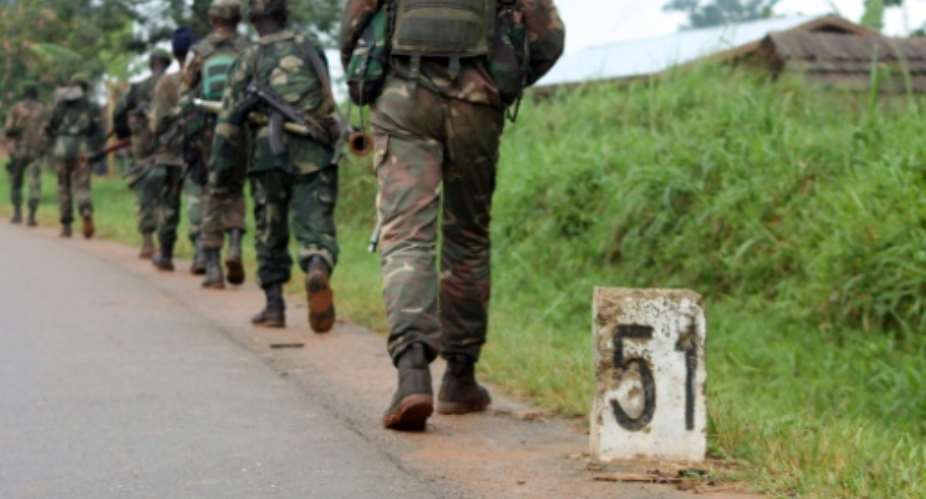Beni (DR Congo) (AFP) - Three people, including a policeman, were killed Wednesday in clashes in a town in eastern Democratic Republic of Congo (DRC) after a massacre sparked angry accusations of security failures by the government, local officials said.
Several hundred people rallied on the main street of Beni at the end of a three-day mourning period called by civil groups over the murder of dozens of people on Saturday night.
At least 50 people were hacked to death, the UN military mission to DRC said Wednesday, in the latest in a two-year string of attacks blamed on rebels.
Police and troops fired tear gas and warning shots in a bid to break up the crowd, but the protestors blocked off streets with barricades.
In the first fatal incident, "a policeman and a civilian were killed, nine people were injured, (comprising) six civilians and three soldiers", Beni Mayor Edmond Masumbuko said.
The head of Beni's civil society movement, Gilbert Kambale, said the civilian fatality was a young man who was killed by a policeman.
The casualty "was shot by a bullet which inflicted an entry wound in the back but did not exit the body," Jeremie Muhindo, a doctor at Beni hospital, told AFP.
At least six demonstrators were arrested in a violent manner and thrown into a military jeep and taken away, an AFP reporter on the scene said.
An effigy of Kabila was burned in the main market, as were flags of Kabila's ruling People's Party for Reconstruction and Democracy (PPRD).
In the second incident, a woman suspected of being a member of the rebel group was lynched in northern Beni, near where the massacre took place, Masumbuko said.
The woman was beaten to death with stones and sticks and her body was then torched, witnesses told AFP.
- Crowds boo premier -
The massacre occurred just three days after President Joseph Kabila visited Beni and vowed to do everything to ensure peace and security in the troubled region.
On Tuesday Prime Minister Augustin Matata was booed by hundreds of demonstrators outside Beni town hall, where he gave a short speech after a three-hour whistle-stop visit.
Matata visited the massacre site along with senior army and police officials.
"What did he come for? We don't need humanitarian aid, but peace," said Germain Katembo, a survivor of the weekend massacre who lost three members of his family.
Beni and the surrounding area have suffered a series of bloody attacks, most of them involving machetes, leaving some 650 people dead since October 2014.
The killings have been blamed by the government and the UN mission in the country on the rebel Allied Democratic Forces (ADF), a partly Islamist armed group of Ugandan origin.
The group has been present in DRC for more than two decades and is accused of a litany of human rights abuses.
The ADF, opposed to Uganda's President Yoweri Museveni, is thought to be deeply embroiled in criminal networks funded by kidnappings, smuggling and illegal logging.
A report published in March by the Congo Research Group at New York University, which looked into the massacres around Beni, claimed that soldiers from the regular army had also participated in the killings.
The DRC was a Belgian colony until independence in 1960, when it became the Republic of Congo. From 1971 to 1997, it was called Zaire.
Vast and mineral-rich, the country is saddled with a reputation for widespread poverty, corruption and political instability. North Kivu province, where Beni is located, seethes with dozens of armed groups.
The United States has warned of more violence in the country should Kabila hold on to power after his mandate expires in December.





 We’ll no longer tolerate your empty, unwarranted attacks – TUC blasts Prof Adei
We’ll no longer tolerate your empty, unwarranted attacks – TUC blasts Prof Adei
 Bawumia donates GHc200,000 to support Madina fire victims
Bawumia donates GHc200,000 to support Madina fire victims
 IMF to disburse US$360million third tranche to Ghana without creditors MoU
IMF to disburse US$360million third tranche to Ghana without creditors MoU
 Truck owner share insights into train collision incident
Truck owner share insights into train collision incident
 Paramount chief of Bassare Traditional Area passes on
Paramount chief of Bassare Traditional Area passes on
 Two teachers in court over alleged illegal possession of BECE papers
Two teachers in court over alleged illegal possession of BECE papers
 Sunyani: Victim allegedly shot by traditional warriors appeals for justice
Sunyani: Victim allegedly shot by traditional warriors appeals for justice
 Mahama vows to scrap teacher licensure exams, review Free SHS policy
Mahama vows to scrap teacher licensure exams, review Free SHS policy
 Government will replace burnt Madina shops with a new three-story, 120-store fac...
Government will replace burnt Madina shops with a new three-story, 120-store fac...
